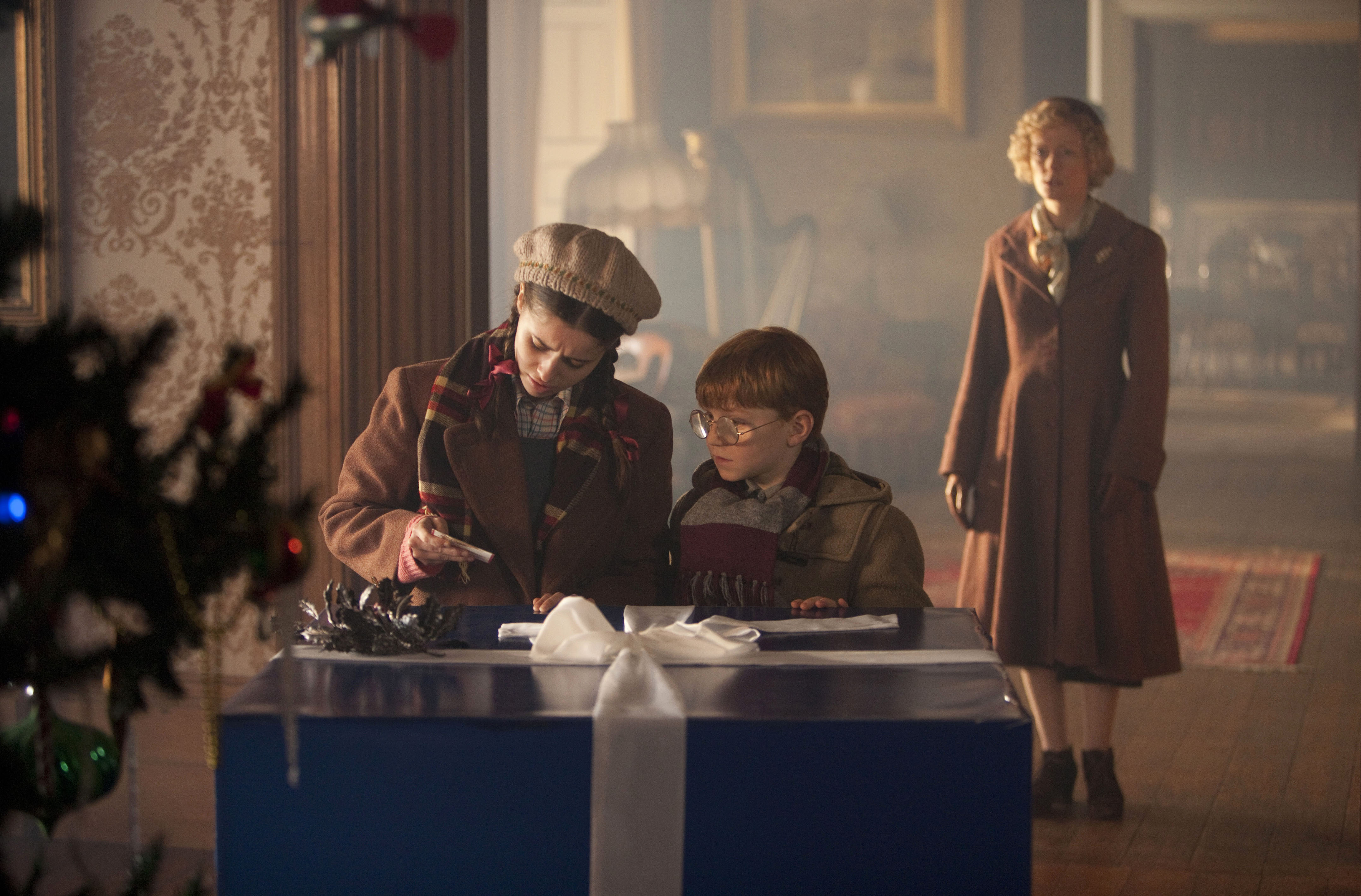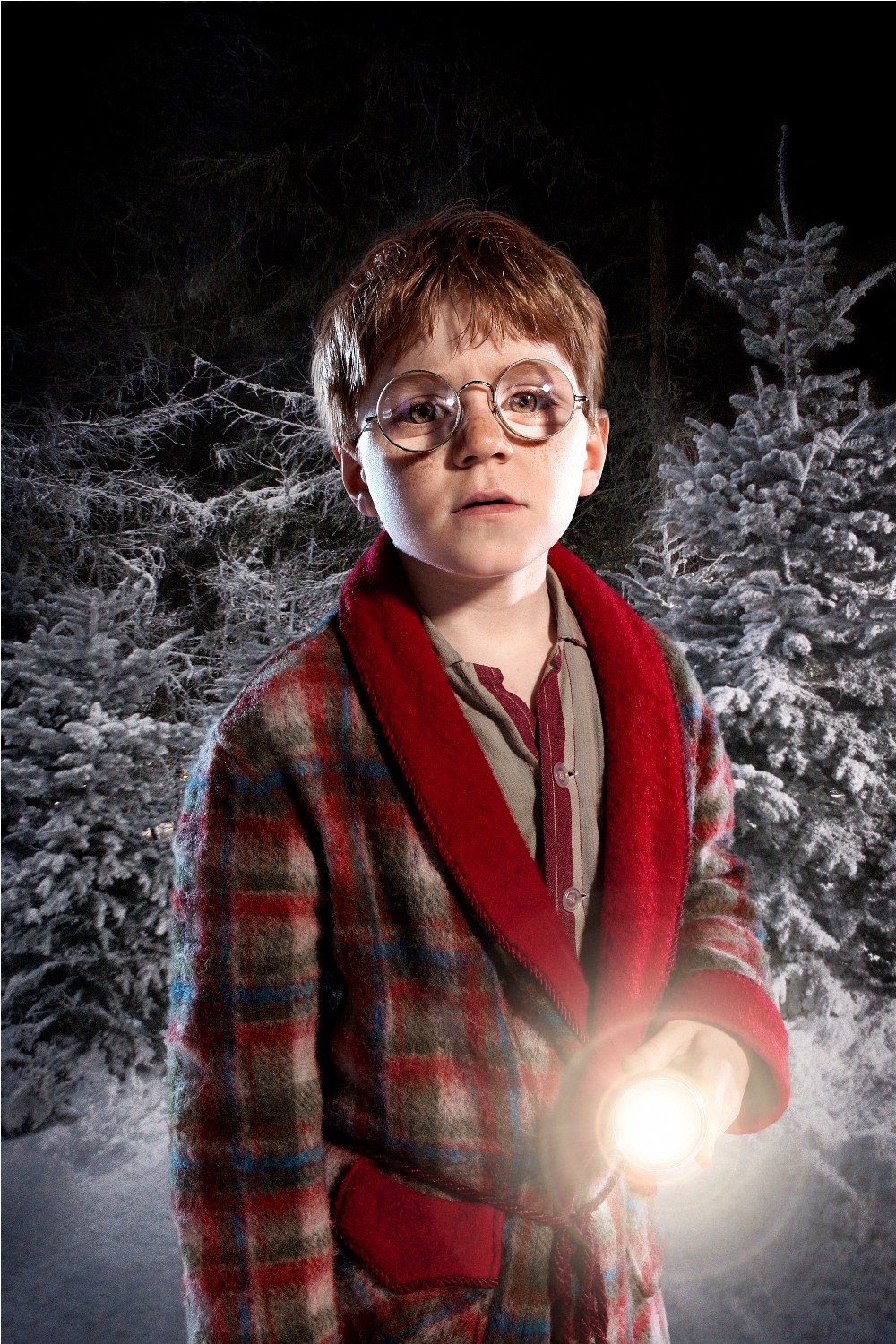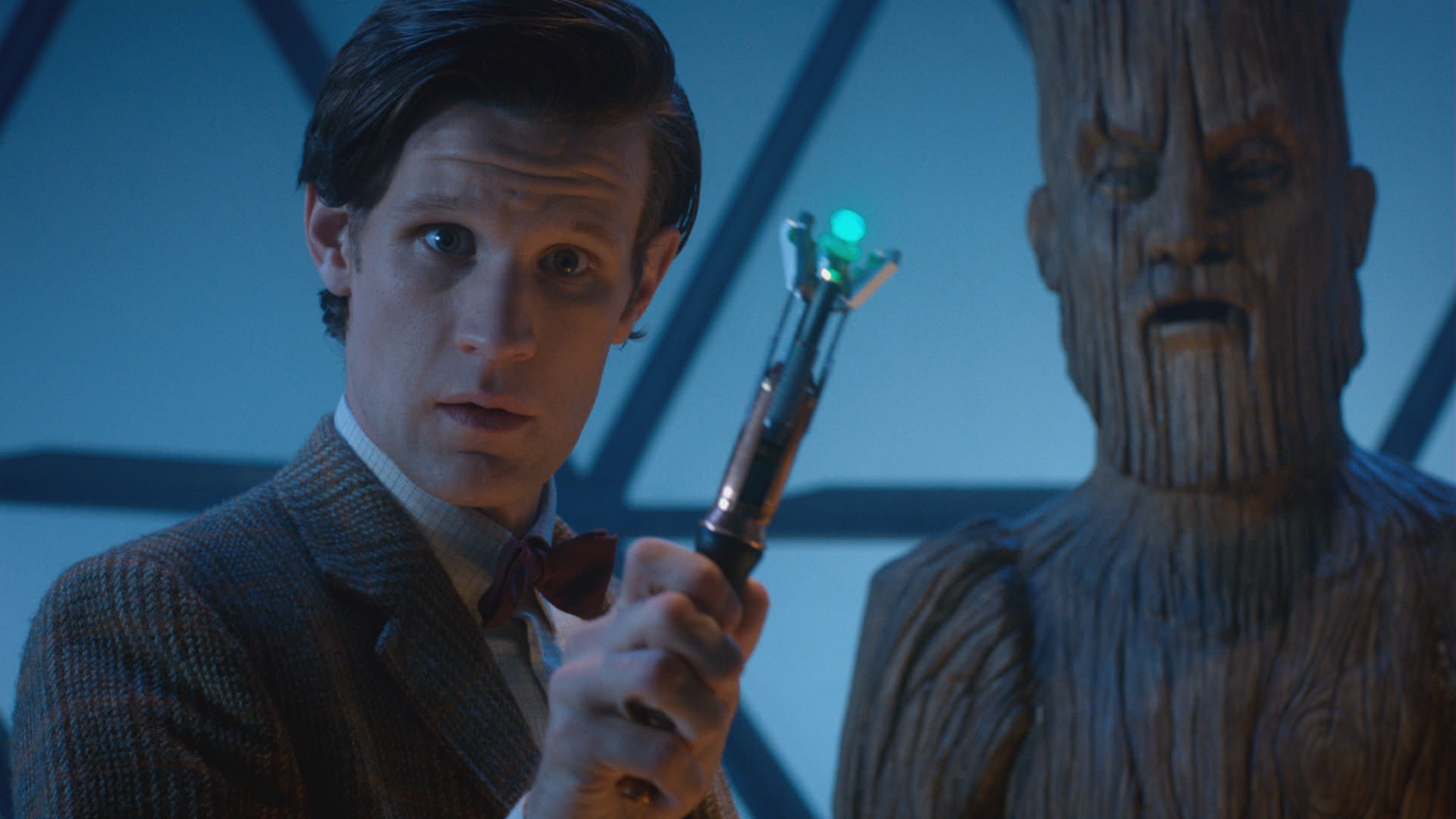Next time you glance up at the stars, spare a thought for your Christmas tree. It’s probably topped by a star, but some of those in the sky might just be the spirit of the tree itself. By helping free the spirits of the trees in a forest, the Doctor transported the symbols of Christmas into an adventure that only he could have instigated. The combination of Christmas, the World War Two setting, Matt Smith’s vitality and a family uncertain of their future ensured this nostalgic fantasy was an instant seasonal classic.
The war is ongoing and Christmas is almost here. Madge Arwell comes across a strange man in a strange suit, whose face she can’t see. She helps him find a police box. She has also received the telegram telling her that pilot husband Reg is lost. Afraid to tell her children, Cyril and Lily, she doesn’t want this to become the Christmas that breaks their hearts. Keeping the secret, she takes them to a country mansion for the holidays and finds a caretaker who’s turned the rooms into a crazy, Willy Wonka version of what comes with Christmas. The caretaker is the Doctor, returning to thank her for helping him out.
 He’s also left a present, a large box, in the living room. It’s irresistible for Cyril, who opens it early. In his dressing gown, he steps in, entering a snowy forest. In turn, they all enter, discovering the gift isn’t what the Doctor thought it was. It’s not Narnia. About to be harvested, the spirits of the forest’s trees need help escaping their fate. Madge is the key and, in full-on protective mother mode, she comes to the aid of Cyril, Lily and The Doctor, giving the spirits their release.
He’s also left a present, a large box, in the living room. It’s irresistible for Cyril, who opens it early. In his dressing gown, he steps in, entering a snowy forest. In turn, they all enter, discovering the gift isn’t what the Doctor thought it was. It’s not Narnia. About to be harvested, the spirits of the forest’s trees need help escaping their fate. Madge is the key and, in full-on protective mother mode, she comes to the aid of Cyril, Lily and The Doctor, giving the spirits their release.
Matt Smith’s Doctor was at his most paradoxical. Manic, charming, eager to please, isolated and jumping in without weighing the consequences, he was forlorn, yet enthusiastic and magnetic. Thankfully, Claire Skinner’s Madge Arwell was there to pull everyone out of danger before it sucked them all in irreversibly. Holly Earl’s Lily Arwell was level-headed, her quizzical acceptance of all that came along exactly what you’d hope for in any kid that comes across the Doctor.
 As Cyril, Maurice Cole was a delight (pictured left). From the Milky Bar Kid on, any boy in oversize, milk-bottle-bottom-lensed round glasses is going to be a classic. Alexander Armstrong has been perfecting the what-ho type for years, so he was perfect. Bill Bailey, Arabella Weir and Paul Bazely as the bumbling, uncertain operatives monitoring the harvesting of the forest tempered the impending peril.
As Cyril, Maurice Cole was a delight (pictured left). From the Milky Bar Kid on, any boy in oversize, milk-bottle-bottom-lensed round glasses is going to be a classic. Alexander Armstrong has been perfecting the what-ho type for years, so he was perfect. Bill Bailey, Arabella Weir and Paul Bazely as the bumbling, uncertain operatives monitoring the harvesting of the forest tempered the impending peril.
Despite the borrowings from The Lion, the Witch and the Wardrobe, the strongest reference was the great Powell and Pressburger film A Matter of Life and Death, released in 1946 as the meaning and effects of the War were being digested. The film was central to the process of understanding. Alexander Armstrong’s Reg Arwell explicitly brought David Niven's Peter Carter to mind, as did the scenes of his lost, doomed plane and his unexpected return to earth. The Doctor became A Matter of Life and Death’s guide, Maris Goring’s Conductor 71. The trees became the film’s angels – as well as stars, angels also crown a Christmas tree.
 There were no Doctor Who perennials: no Daleks, no Cybermen, and virtually no role for any companions (Amy and Rory were seen at the end). The modern series isn’t tied to its history. The wooden King and Queen created by the forest were never going to be adversaries. The Doctor and Doctor Who renew themselves just as the programme bowls onwards. Six years and three Doctors after it returned to the TV schedules, The Doctor, the Widow and the Wardrobe was further confirmation that the series is in a constant state of renewal.
There were no Doctor Who perennials: no Daleks, no Cybermen, and virtually no role for any companions (Amy and Rory were seen at the end). The modern series isn’t tied to its history. The wooden King and Queen created by the forest were never going to be adversaries. The Doctor and Doctor Who renew themselves just as the programme bowls onwards. Six years and three Doctors after it returned to the TV schedules, The Doctor, the Widow and the Wardrobe was further confirmation that the series is in a constant state of renewal.
However Doctor Who has evolved, the question of which of his predecessors Smith most closely evokes inevitably bubbles up. This Christmas, the lonely, can’t-get-it-quite-right, slightly patrician Doctor offered a subtle nod to where it all began. Was he a souped-up William Hartnell? But as ever, the Doctor will move on, leaving such thoughts behind.
Overleaf: watch the trailer for The Doctor, the Widow and the Wardrobe

 He’s also left a present, a large box, in the living room. It’s irresistible for Cyril, who opens it early. In his dressing gown, he steps in, entering a snowy forest. In turn, they all enter, discovering the gift isn’t what the Doctor thought it was. It’s not Narnia. About to be harvested, the spirits of the forest’s trees need help escaping their fate. Madge is the key and, in full-on protective mother mode, she comes to the aid of Cyril, Lily and The Doctor, giving the spirits their release.
He’s also left a present, a large box, in the living room. It’s irresistible for Cyril, who opens it early. In his dressing gown, he steps in, entering a snowy forest. In turn, they all enter, discovering the gift isn’t what the Doctor thought it was. It’s not Narnia. About to be harvested, the spirits of the forest’s trees need help escaping their fate. Madge is the key and, in full-on protective mother mode, she comes to the aid of Cyril, Lily and The Doctor, giving the spirits their release. As Cyril, Maurice Cole was a delight (pictured left). From the Milky Bar Kid on, any boy in oversize, milk-bottle-bottom-lensed round glasses is going to be a classic. Alexander Armstrong has been perfecting the what-ho type for years, so he was perfect. Bill Bailey, Arabella Weir and Paul Bazely as the bumbling, uncertain operatives monitoring the harvesting of the forest tempered the impending peril.
As Cyril, Maurice Cole was a delight (pictured left). From the Milky Bar Kid on, any boy in oversize, milk-bottle-bottom-lensed round glasses is going to be a classic. Alexander Armstrong has been perfecting the what-ho type for years, so he was perfect. Bill Bailey, Arabella Weir and Paul Bazely as the bumbling, uncertain operatives monitoring the harvesting of the forest tempered the impending peril. There were no Doctor Who perennials: no Daleks, no Cybermen, and virtually no role for any companions (Amy and Rory were seen at the end). The modern series isn’t tied to its history. The wooden King and Queen created by the forest were never going to be adversaries. The Doctor and Doctor Who renew themselves just as the programme bowls onwards. Six years and three Doctors after it returned to the TV schedules, The Doctor, the Widow and the Wardrobe was further confirmation that the series is in a constant state of renewal.
There were no Doctor Who perennials: no Daleks, no Cybermen, and virtually no role for any companions (Amy and Rory were seen at the end). The modern series isn’t tied to its history. The wooden King and Queen created by the forest were never going to be adversaries. The Doctor and Doctor Who renew themselves just as the programme bowls onwards. Six years and three Doctors after it returned to the TV schedules, The Doctor, the Widow and the Wardrobe was further confirmation that the series is in a constant state of renewal.